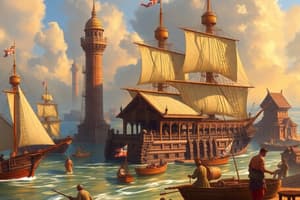Podcast
Questions and Answers
What year did the East India Company acquire a charter from Queen Elizabeth I?
What year did the East India Company acquire a charter from Queen Elizabeth I?
What was a major advantage granted to the East India Company by its charter?
What was a major advantage granted to the East India Company by its charter?
What was the primary method Mercantile trading companies used to make profits?
What was the primary method Mercantile trading companies used to make profits?
What was the main goal of the East India Company after acquiring its charter?
What was the main goal of the East India Company after acquiring its charter?
Signup and view all the answers
Who was the ruler of England when the East India Company was granted its charter?
Who was the ruler of England when the East India Company was granted its charter?
Signup and view all the answers
Which European power established a base in Goa on the western coast of India?
Which European power established a base in Goa on the western coast of India?
Signup and view all the answers
Who was the Portuguese explorer that discovered the sea route to India in 1498?
Who was the Portuguese explorer that discovered the sea route to India in 1498?
Signup and view all the answers
By the early seventeenth century, which nation was also exploring trade opportunities in the Indian Ocean?
By the early seventeenth century, which nation was also exploring trade opportunities in the Indian Ocean?
Signup and view all the answers
What geographical area did the first English ships navigate to reach India?
What geographical area did the first English ships navigate to reach India?
Signup and view all the answers
What was the situation in the Eastern markets by the time the first English ships set sail?
What was the situation in the Eastern markets by the time the first English ships set sail?
Signup and view all the answers
Study Notes
Establishment of the East India Company
- Founded in 1600, the East India Company was granted a charter by Queen Elizabeth I.
- The charter provided the Company with exclusive rights to trade with the East, prohibiting competition from other English trading groups.
- This monopoly allowed the Company to expand its trade activities without fear of rivals.
Trade Practices and Strategies
- The Company's strategy involved exploring new lands to acquire goods at lower prices.
- It transported these goods back to Europe, where they were sold at significantly higher prices.
- The mercantile trading model relied heavily on creating and maintaining exclusivity in trade, which facilitated profit maximization.
Impact on Trade Dynamics
- The East India Company's charter demonstrated the shift towards state-supported monopolies in trade during the early modern period.
- The focus on securing a competitive edge over other trading entities was essential for profitability in mercantile ventures.
- This model ultimately set a precedent for future colonial and trade enterprises, influencing the global trade landscape.
European Competition in Eastern Markets
- The royal charter failed to prevent other European nations from entering Eastern markets.
- English exploration began with ships sailing down the west coast of Africa, around Cape of Good Hope, leading to the Indian Ocean.
Portuguese Presence in India
- The Portuguese established a strong foothold on the western coast of India.
- Goa served as the primary base for Portuguese operations in the region.
- Vasco da Gama was a key figure, discovering the sea route to India in 1498, facilitating trade with the East.
Dutch and French Trade Exploration
- By the early seventeenth century, the Dutch began exploring trade opportunities in the Indian Ocean.
- Following the Dutch, French traders also started to engage in commerce in the region, contributing to the competitive landscape.
Studying That Suits You
Use AI to generate personalized quizzes and flashcards to suit your learning preferences.
Description
This quiz explores the history of the East India Company, focusing on its charter from Queen Elizabeth I in 1600. It examines the implications of the monopoly granted to the Company and its impact on trade with the East. Test your knowledge on this significant turning point in commercial history.




